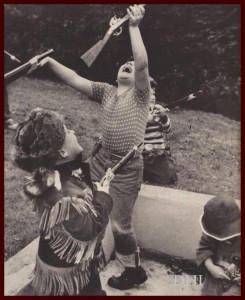-David Crockett Autobiography [1834]
Why did it happen? It is a popular question, but one that has no easy answer. It is a question that many have had trouble answering, including the likes of Walt Disney, Bill Walsh, Fess Parker, and more.
As far as television was concerned, there had been nothing remotely like it up to that time. The quality of the series was sound in most respects. The story and performances were exceptional. It had good music and a “catchy tune.” These factors were necessary, yet there had to be more for it to beget such a response.
The social and political climate of the 1950s certainly played a major role in its success. The fear of Communism had people’s patriotism at a fever pitch. It is likely that the show intensified these feelings. With the tensions of the Cold War, even children were receiving large portions of Americanism in the schools. The Pledge of Allegiance, air raid drills, anti-Communist assemblies, and nuclear safety training were all common-place in the 1950s. Davy Crockett as portrayed by Fess was as American as apple pie and as such it played to the patriotic emotions of the era. Margaret King, in her doctoral dissertation on the Crockett craze, intimates that Davy’s appeal “might have been the direct result of the general feeling of the time that what the country needed in the face of the Red Scare was deeds instead of words.”
The Craze’s timing coming after World War II could not have been better. Economic growth was surging and there was a new abundance of consumer products. This new attitude of “consumerism” fueled the fire when it came to the Crockett merchandise. Furthermore, all of the post-World War II babies–now called the “baby boomers”–were just coming into the prime age group for the Crockett series.
Crockett was also a real life hero, not a fantasy super hero. Many of the heroes that appeared in popular culture up to the time of Disney’s Crockett had been imaginary–Buck Rogers, Space Cadets, Superman, and so forth. Children could grasp the reality of the frontiersman much easier, and more importantly, they could truly believe that they could become someone like Davy Crockett. He was easy to identify with. Ernst Dichter, an expert on fads, took a stab at the “real-life hero” hypothesis for the craze: “Children are seeking for an opportunity to explain themselves in terms of the tradition of this country. Crockett gave them that opportunity. On a very imaginative level the kids really felt they were Davy Crockett.”
“A fad satisfies a need for status and common experience among kids.” commented Paul F. Lazarsfeld, chairman of Columbia University’s Department of Sociology, “Parents welcome it, too–sometimes subconsciously. First, because it helps keep the kids out of their hair. Second, because the hunger of children for new experiences usually is far beyond the inventive capacity of even the most devoted parents. And a fad provides a clear-cut line of gratifactions: `If you’re good, you’ll get a Davy Crockett cap.’ “
James L. Baughman in the book Hollywood in the Age of Television, advances one of the most unique theories, “many parents had discovered at the height of the Crockett craze, to their horror: it was hard to say no to children.” Furthermore, many of these parents that simply could not say “no,” grew up during the Depression and had to go without. It was so much easier to just buy little junior (or junior-ette) that extra Crockett item.
Regardless of why–the craze happened–and it taught us a great deal. Tomorrow here at the Institute for our DHI FESS-Tival, I’ll take a look at Crockettmania and some of the incidents responsible for earning it the status of “craze.”


Recent Comments